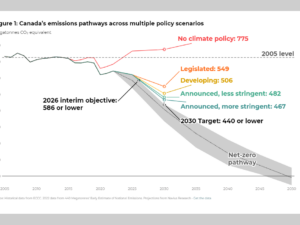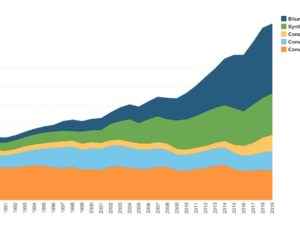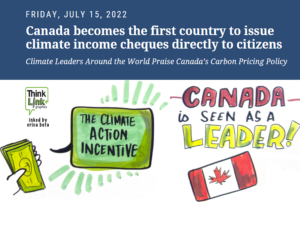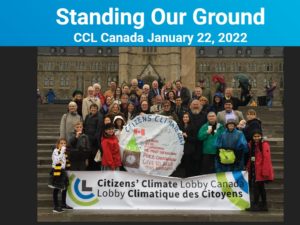Dear Sir, I am writing to you in response to the government’s proposed cap on emissions from the oil and gas sector. I support a cap which is rigourous, immediate, with no loopholes. This is necessary to maintain geographical and sectoral balance in Canada’s economy as we transition to net zero. I am a chemical engineer by training and worked as a manager and advisor in the upstream and downstream fossil fuel industry in Canada and overseas for 13 years. At the time I did not know about greenhouse gases and their contribution to climate disruption. Now I do. With this knowledge I now work with other citizens to advocate for climate justice and a livable world, now and into the future. As your government’s discussion paper notes, the oil and gas sector is the highest emitting sector of the Canadian economy, contributing 27% of all emissions in 2020. That level of emissions continues to increase while some provinces and other sectors of the economy are reducing their emissions. This is not fair. There must be geographical and sectoral balance in reducing Canada’s emissions, and that necessitates an absolute and significant reduction in emissions from the oil and gas sector. Sooner rather than later. Canadians agree. A poll released this month by Abacus showed that a strong majority of Canadians support a cap on oil and gas emissions to ensure that the fossil fuel industry does its fair share in achieving Canada’s climate goals. A majority also believes that such a cap should be rigourous, with no delays or offsets. I agree. Some considerations: A 1.5degC-aligned trajectory. The emissions cap needs to reflect Canada’s responsibility to do its fair share to keep the global temperature rise from pre-industrial levels to less than 1.5°C. A strong 2026 target is critical to achieving early and ambitious emissions reductions. Front-loading climate action is the most cost-effective way to reach a given temperature target. Failure to reduce emissions early could make later emissions targets impossible to achieve. No delays. In Sept 2021, the Liberal Party promised to “[make] sure the oil and gas sector reduces emissions from current levels at a pace and scale needed to achieve net-zero by 2050, with 5-year targets starting in 2025.” Now a whole year has gone by. The final regulation for a cap must be adopted and in place in 2023. Furthermore, the 2026 and 2030 cap levels should be announced before the end of the year in order to send immediate and clear signals to the industry. An enforceable cap on absolute levels of emissions which achieves real reductions. Of the two options put forward in the government discussion paper, the cap and trade approach (Option 1) provides more certainty that emissions reductions targets will be met, and modified carbon pricing (Option 2) fits well with the government’s current price on pollution and allows the market to drive the changes needed. Either can work. The main criterion should be which option can be implemented the fastest since time to limit warming to 1.5degC is rapidly running out. No loopholes. The policy must ensure that the oil and gas sector actually reduces its own emissions. It should not allow companies to avoid their obligations by purchasing offsets, which means paying other sectors or countries to reduce emissions rather than cutting emissions directly, and would mean a free pass for the oil industry. Companies should only receive credit for proven reductions, not hypothetical reductions based on carbon capture projects that have yet to be commissioned. The policy should not allow for so-called “compliance flexibility,” which means giving companies more wiggle room in the early years, when the need to drive down emissions is most urgent. Include strong enforcement measures. Penalties or fines should be significant enough to serve as a strong deterrent rather than allow companies to internalize these as a small cost of doing business. Compliance mechanisms that are not financial should also be considered. Comprehensive in scope. All oil and gas activities and facilities in Canada, including pipelines, refineries, and liquefied natural gas export facilities, should be covered by the cap. No subsidies to oil and gas companies for regulatory compliance. Oil and gas companies are making windfall profits. These companies must clean up their own mess without having to rely on taxpayers to foot the bill, including for unproven technologies such as carbon capture and “blue” hydrogen. Channeling monetary proceeds from the cap to oil and gas companies would violate Canada’s commitment to phase out fossil fuel subsidies. Uphold Indigenous rights. The policy must uphold the inherent title and rights of Indigenous peoples and other rights affirmed in the United Nations Declaration on the Rights of Indigenous Peoples and legislated by the Government of Canada,including securing Indigenous Peoples’ free, prior, and informed consent for energy development on their territory. Integrate equity into policy development. Equity and environmental justice considerations must be integrated into policy design. Monetary proceeds from the cap should be used to support a Just Transition for affected communities and workers, and communities who have been negatively impacted by the sector historically, specifically low-income, Indigenous and racialized communities. Your discussion paper notes the significant role that the oil and gas sector plays in the current Canadian economy. But there are already more people employed in the clean technology sector than in the fossil fuel industry and that continues to grow while employment in the fossil fuel industry shrinks. The green economy is the future and Canada risks missing out on jobs and investment in clinging to fossil fuels. So I support the government’s climate program and its commitment to capping oil and gas emissions. This cap must be real and implemented within a year. This will impose a significant administrative burden. The government responded quickly and effectively to the Covid emergency. Canada has declared a climate emergency. We need to act like it is just as real and urgent as the pandemic. Yours truly Douglas J. Pritchard, BASc, MSc, PhD, PEngEnvironment Canada is taking submissions until September 30 on regulations for capping emissions in the oil and gas industry. Below is the submission from Doug Pritchard (CCL Beaches-East York). He used resources from Environmental Defence and us to help him write his letter, and then he emailed the letter to:
PlanPetrolieretGazier-
OPEN LETTER Citizen Feedback on Cap on Oil and Gas
Home » CCL Canada News » OPEN LETTER Citizen Feedback on Cap on Oil and Gas






